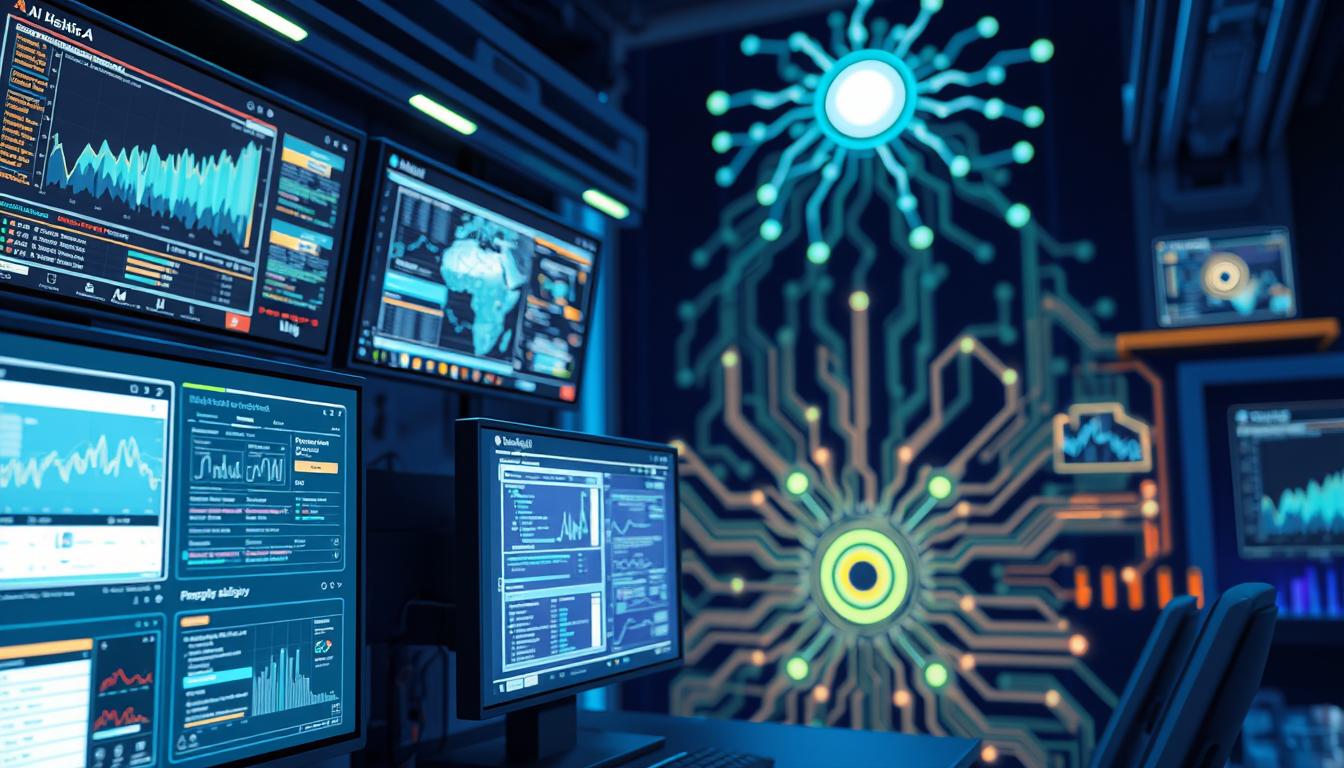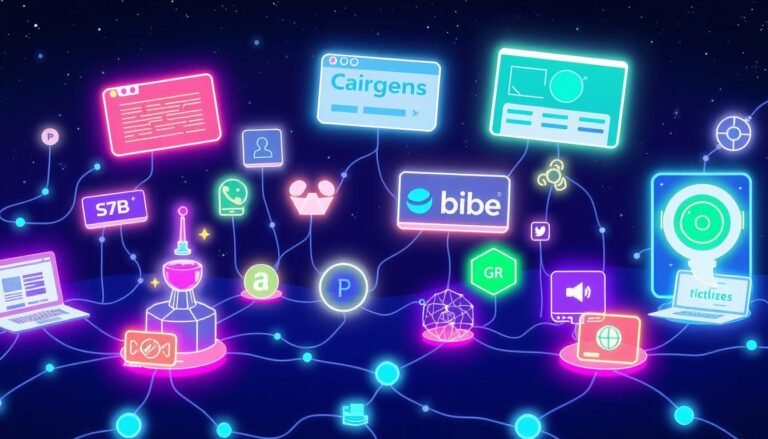What is the Best AI Detector
In today’s digital world, AI-generated content is everywhere. But how do we know what’s made by humans and what’s made by machines? AI detectors are the latest tools in the fight for real content. They use advanced technology to find AI-written text, leading to a big question: Which AI detector is the best in this digital game of hide-and-seek?
AI content detection tools are crucial in our tech-filled lives. They act like digital detectives, using machine learning to find fake content online. From essays to social media posts, these tools search for signs of AI-made content.
The growth of advanced AI writing has led to a tech race. As AI text gets more like human writing, we need better tools to spot it. Schools, publishers, and businesses use these tools to keep content real and trustworthy.
Key Takeaways
- AI detectors use advanced algorithms to identify machine-generated content
- The accuracy of AI detection tools varies, with some boasting up to 99.6% accuracy
- Pricing for AI detectors ranges from free options to subscription plans starting at $9.99 monthly
- Some detectors offer specialized features for academic use and plagiarism checking
- The effectiveness of AI detectors can vary based on the type of AI-generated content
Introduction to AI Content Detection
AI content detection is now a big deal as AI writing tools become more common. These tools try to tell if text was written by a human or a machine. With more AI content online, we need better AI text classifiers.
AI detectors use advanced technology to check writing style, word choice, and patterns. They look at sentence length, vocabulary, and how the text is structured. Their goal is to find AI-written content and ensure it’s genuine.
| AI Detector | Key Feature | Accuracy |
|---|---|---|
| Originality.AI | Powerful plagiarism checker | 90% for AI content |
| Content at Scale | Human-written score (0-100%) | Data not provided |
| Winston AI | Free plan available | Claims 99% accuracy |
These tools are vital for keeping content real in many areas. From schools to news outlets, AI detectors help identify AI-written content. As AI writing gets better, so does the need for better detection technology.
The Rise of AI-Generated Content
AI-generated content is changing the digital world fast. It’s creating everything from articles to images at an amazing rate. This has brought both excitement and worry to many industries.
Impact on Various Industries
AI has changed how we make content in education, journalism, and marketing. In schools, AI helps with research and writing. Newsrooms use it for quick reports on complex data.
Marketers use AI to make content that feels personal and is made in large amounts.
Concerns About AI Content Authenticity
As AI content gets better, worries about its truth grow. A study found 38% of readers can’t tell AI from human writing. This makes us question the trustworthiness and originality of online content.
The Need for Reliable Detection Tools
It’s key to keep trust online with tools that spot AI content. Tools like Winston AI and TraceGPT are very good at this. They look at patterns, word choices, and style to tell AI from human writing.
As AI gets better, we need better tools to catch it. Schools, newsrooms, and cybersecurity teams all need these tools. They help check if content is real and fight fake news. The future of AI detection looks bright, with more accurate and specific tools coming our way.
What is the Best AI Detector
Finding the best AI detector is key in today’s digital world. With AI-generated content on the rise, it’s important to know who wrote what. The top AI detector should be accurate, easy to use, and work with many AI models.
Many AI detectors are popular. Originality.ai says it’s 99% accurate, spotting human writing as 96% human and AI as 100% AI. Turnitin’s AI Writing Detection tool also does well, marking human writing as 98% human.
Winston AI is another strong contender. It labels human writing as 75% human and AI as 99% AI. This tool claims up to 99.6% accuracy in spotting AI text. Copyleaks works differently, correctly identifying human writing without a score and pointing out AI parts.
When picking the best AI detector, look at features like plagiarism checks and authorship verification. The best tool should keep up with AI changes and avoid false positives and negatives. Choosing a reliable AI detector helps keep your content real and builds trust online.
How AI Detectors Work
AI detectors are key in fighting AI-generated content. They use advanced methods to spot machine-made text. Let’s dive into what makes them work well.
Machine Learning Algorithms
AI detectors depend on machine learning algorithms. These algorithms study huge datasets of both human and AI texts. They use tools like Decision Trees and Random Forest to guess where a text comes from.
Natural Language Processing Techniques
Natural Language Processing (NLP) is vital for AI text classifiers. It helps them grasp language’s subtleties. They examine sentence structure, word choice, and text flow. NLP lets them detect small differences between human and AI writing.
Pattern Recognition in AI-Generated Text
AI detectors are great at finding patterns in machine-made content. They look at things like perplexity and burstiness. High perplexity usually means human writing, while low perplexity might point to AI. But, creative human writing can sometimes trick them.
Artificial intelligence plagiarism checkers have made big improvements. Yet, they’re not 100% accurate. Studies show they’re right about 70% of the time. But, they can also wrongly flag human-written texts as AI-made, 10-28% of the time. As AI writing tools get better, detectors need to keep up to stay effective.
Top AI Detectors in the Market
Many tools have come forward as the best AI detectors. They help users spot AI-generated content with good accuracy. Each tool offers unique features.
GPTZero is known for its high accuracy. It correctly identified all articles, human or AI-made. Copyleaks also did well, except for one AI piece.
So, what’s the best AI detector? Let’s look at the top ones:
| AI Detector | Key Feature | Pricing (Monthly) | Accuracy |
|---|---|---|---|
| Originality AI | Best Overall | $14.95 | 94%+ |
| Content at Scale | Ease of Use | $49 | High |
| Winston AI | Content Writers | $18 | Very High |
| GPTZero | Free Option | $0 – $35 | Excellent |
| Copyleaks | Marketing Agencies | $9.16 | Near Perfect |
These detectors use smart algorithms to spot AI content. When picking the best, think about accuracy, cost, and features you need.
Comparing AI Detector Accuracy
AI authorship detection is key in today’s world of machine-generated content. We must look at how these tools are tested, their performance, and how they do in real life.
Testing Methodologies
AI detectors are tested with both human-written and AI-created content. This mix helps see if they can spot the difference well.
Performance Metrics
Important metrics include false positives, false negatives, and confidence levels. These show how reliable and precise a tool is.
Real-World Results
Many AI detectors have done well in real-world tests:
- TraceGPT scored 99.91% for ChatGPT and 99.93% for Claude content.
- Winston AI correctly identified 85% of human text and 93% of ChatGPT content.
- GPTZero performed well with ChatGPT and mixed content.
| AI Detector | ChatGPT Accuracy | Human Text Accuracy | Additional Features |
|---|---|---|---|
| TraceGPT | 99.91% | Not specified | Plagiarism checker, authorship verification |
| Winston AI | 93% | 85% | OCR support, browser extensions |
| GPTZero | High (exact % not specified) | High (exact % not specified) | Chrome extension, API access |
These results show AI authorship detection tools are getting better. They give users solid ways to spot machine-generated content.
Features to Look for in AI Detectors
When picking an AI detector, look for a few key things. Accuracy is top on the list. Tools like GPTZero and Copyleaks have shown they can spot AI-generated content well. GPTZero even got it right every time in a recent study.
It’s also important to find a tool that’s easy to use. Many offer browser extensions, making it easy to check content anywhere. For example, TraceGPT and Winston AI have Chrome extensions for quick checks.
For users worldwide, multi-language support is a must. Some detectors can check text in many languages. Also, think about integration options. Tools like Winston AI work with platforms like Blackboard and Google Classroom.
Other features can also be helpful:
- Plagiarism checking
- Readability analysis
- OCR capabilities for scanning documents and images
- API access for custom integrations
Don’t forget about pricing. Many detectors have free plans, like GPTZero’s 10,000 words per month. Paid plans start around $10-$15 a month for more use.
By looking at these features, you can find the right AI detector for your needs.
Limitations of Current AI Detection Technology
When we ask “What is the Best AI Detector,” we must face the challenges of today’s AI text classifiers. These tools are promising but still have big limitations. These issues affect how well they work and how reliable they are.
False Positives and Negatives
AI detectors often struggle with accuracy. For example, Turnitin’s AI-detection tool might miss about 15% of AI-generated text. This is a big problem because many AI-detection tools are not accurate or reliable.
This can lead to false accusations against students. It can also mean missing AI-generated content.
Evolving AI Writing Techniques
The fast change in AI writing techniques is a big challenge for detection tools. Research from the University of Adelaide shows students might find ways to beat any AI-detection tool. This constant battle makes it hard to keep detection tools accurate.
Challenges in Detecting Sophisticated AI Content
It’s hard to spot sophisticated AI content. There’s no clear way to tell if text is AI-generated. Also, there are no universal standards or rules to help monitor and control AI content.
As AI text classifiers get better, they need to overcome these challenges. They must provide more reliable results.
Source Links
- 10 Best AI Detection Tools for Teachers & Professors
- The best AI content detectors in 2024 | Zapier
- 5+ Best AI Content Detectors for 2024
- 9 Best AI Content Detectors in 2024 (Future Proof Your Content)
- The Science Behind AI Content Detectors: Insights into Their Methods and Accuracy
- The best AI content detector – Do they work?
- 5 Top AI Detection Tools | Built In
- What Are The Best AI Detectors?
- Do AI Detectors Really Work? I Put Them to Test
- The 10 Greatest AI Content Detector Tools
- How Reliable Are AI Detectors? Claims vs. Reality
- 4 Ways AI Content Detectors Work To Spot AI
- What Are the Best AI Detectors?
- 12 Best AI Detectors for 2024
- Types of AI Detectors You Need to Know | Undetectable AI
- I tested 7 AI content detectors – they’re getting dramatically better at identifying plagiarism
- 32 Best AI Content Detection Tools Reviewed – Originality.AI
- Professors proceed with caution using AI-detection tools
- AI Detectors Don’t Work. Here’s What to Do Instead. – MIT Sloan Teaching & Learning Technologies
- AI detection tools: the challenge of today’s digital age.







